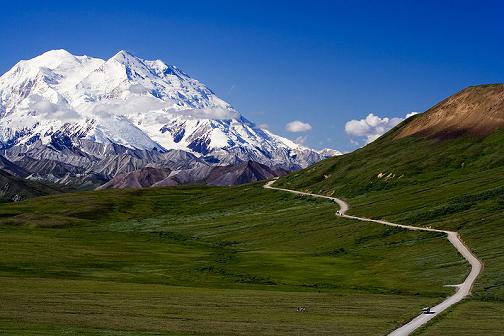
Every Monday, “Science and the Sacred” features an essay from one of The BioLogos Foundation’s leaders: Francis Collins, Karl Giberson and Darrel Falk. Today’s entry was written by Darrel Falk.
We all love origins-stories — be it stories about our own family history, the formation of our nation, the early days of the motor car or the key figures who ushered in the computer age. Whatever the setting, origins stories excite the imagination, and telling these stories is central to culture.
I am writing this entry in the tranquility of Alaska’s Denali National Park. It is a rare natural setting that exists much as it would have thousands of years ago other than a few campgrounds and the quiet road that winds 90 miles into the park’s isolated interior. Yesterday I watched two bull moose graze on willow shrubs, a wolf lie in wait for a caribou that it eventually pulled down, and a mother grizzly and its cub feast on a freshly killed caribou. On the mountain cliffs high above were scores of sheep, while in the foreground a young beaver swam in its front yard pool near a mound of sticks and dirt that served as its home. I saw mile-wide river beds filled with gravel deposited by receding glaciers that still existed in the upper reaches. And as the clouds lifted one morning, I saw Denali herself, the towering queen on her throne rising majestically 20,000 feet into the sky.
Everyone who visits Denali National Park wants to know its origins stories. Books, movies and countless tour bus narrators pamper our innate desire to learn about origins. I have read about the native Alaskan legends of how the great mountain came to be, and I bought a book that tells me about its geological history. I can tell you the stories about the arrival of gold miners in the late 1800’s and their wholesale slaughter of sheep, wolves and bears. I can tell you about a visionary who fought to protect the wildlife in an age where no one else seemed to care. Without him and his tireless efforts of 100 years ago, what I enjoy today would have long since changed into barren territory noted only for its abandoned mines. I can tell you about the congressional bill that doubled the park’s size with one stroke of President Carter’s pen in 1980 and its renaming from McKinley to Denali. It seems everyone who visits wants to know about the origin of this national treasure.
The focus of these origins accounts, however, is always on how the park came to be. The accounts don’t tell us anything about the origin of spruce, willow, alder and birch trees that populate the park. We are told nothing about the origin of the plethora of flowering species that turn much of the landscape into a multicolored garden. The origins stories don’t include books about the origin of mammals or any details on how the various minerals in the rocks came into existence. The origins stories of Denali leave these questions unanswered. I didn’t even find any books explaining the details of why it seems to never get dark in Denali. The answers to these deeper questions are found in other stories for other times.
InterVarsity Press, a Christian publishing company, recently published a fascinating book by John Walton, a theological studies professor at Wheaton College. In The Lost World of Genesis One: Ancient Cosmology and the Origins Debate,
Walton explores the origin of what many would consider the ultimate origins-story. He reminds us that Genesis one was originally written for the nation of Israel. To understand this divinely inspired message to ancient Israel, not only do we have to translate the Hebrew into present-day English, but we must try to understand the cultural context of the people for whom it was written. What questions were those people asking, and how did Genesis I provide them with answers to those questions? Just as the Denali origins-stories don’t provide answers to the questions no one is asking when they see the park, so Walton argues that we need to understand those questions, translate the language into ours and mentally insert ourselves into the ancient culture to hear it through their ears in order to fully grasp the original Hebrew origins stories.
Walton also examines the origins stories of the surrounding cultures. He indicates that none of these stories address questions about the origin of material or the origin of plants and animals. None of these stories address questions about how the universe came into existence. They do, however, answer questions about how the universe’s current cosmic order arose. They address questions about how the ancient gods acquired their current functions in the universe, and they answer questions about how people fit into the picture. The presence of material — of animals, plants and people — is just assumed. The questions we ask today about origins, says Walton, were not being asked at that time.
Just like the Denali National Park origins stories answer questions like, “How did the park come to be?” but not, “How did the plants, animals and minerals of Denali park come into existence?”, so do the Hebrew origins stories only answer the questions being asked at the time. Because the surrounding cultures were telling the former type of origins story, Walton explores whether Genesis I is that type of story as well.
The Hebrew word bara, which we translate as “to create,” is used in Genesis I. To determine what this word meant to the ancient Hebrews, Walton examines how it is used in other scriptural contexts. He found that it is used 55 times. Repeatedly, the context in which it is used is that of bringing about new function, or order, to something that pre-existed. It is never unambiguously used in the context of creating some new entity. Beyond this, Walton provides much evidence that Genesis I was answering the Denali Park sort of origins-question.
The ancient Israelites, Walton says, would have understood Genesis I to be literally true. But it was not the story of the beginning of the cosmos or the beginning of life. It was the story of how all of this came to be ordered by God, functioning in God’s kingdom. It was their divinely inspired answer to the question that everyone around them was asking. Although in our materially focused culture we want to know how and when the stuff of the universe originated, this was of no interest to the ancient people; it is likely they never even thought to ask it.
Although many people in today’s society insist we take Genesis I literally, Walton says that in the true, literal reading, the story is not about cosmological or biological origins at all. The Bible, he says, is actually silent about this. He tells us that true respect for the authority of Scripture means that we don’t demand that it answer questions it was not addressing.
This is my last day in Denali National Park. It is crystal clear today. I will leave in a few minutes to see the mountain one last time. I have many stories to tell my grandchildren when I get home, none of which talk about the origin of minerals, trees and mammals. Those are other stories for other days.
Darrel Falk is a biology professor at Point Loma Nazarene University in San Diego and executive director of The BioLogos Foundation.

